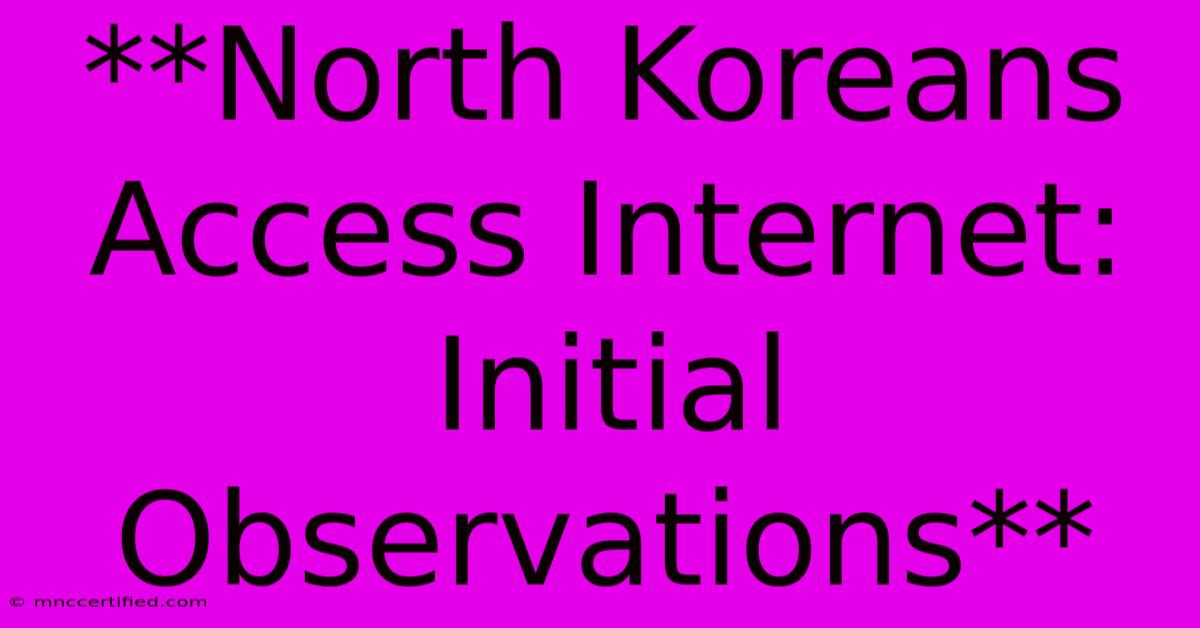**North Koreans Access Internet: Initial Observations**

Table of Contents
North Koreans Access Internet: Initial Observations
The internet has become an essential part of life for most of the world, but access remains tightly controlled in North Korea. However, recent developments suggest a shift in this landscape, with more North Koreans gaining access to the internet. While information is still scarce, we can begin to draw some initial observations about this evolving situation.
The Limited Access Landscape
North Korea's internet access has traditionally been restricted to a select few, primarily government officials and elites. The country operates its own intranet, known as Kwangmyong, offering limited access to a curated selection of websites and information. This intranet serves as a propaganda tool, shaping the narrative and controlling the information flow within the country.
Emerging Signs of Change
Recent reports and anecdotal evidence suggest a gradual increase in internet access among ordinary North Koreans. Some factors driving this change include:
- Increased economic engagement: The North Korean government has been seeking to foster economic growth and attract foreign investment. This has led to an increased need for internet access for businesses and individuals involved in international trade.
- Technological advancements: The widespread adoption of mobile devices and the availability of cheaper internet services are making it easier for North Koreans to access the internet, even with restrictions.
- Information seeking: The growing desire for information about the outside world, especially among younger generations, is prompting individuals to seek alternative ways to access the internet.
Initial Observations
Despite the limited access, initial observations from the increasing number of North Koreans using the internet reveal some interesting patterns:
- Strong interest in global news: Reports indicate a strong appetite for information about international events, particularly news related to South Korea, the United States, and other major world powers.
- Use of VPNs and proxy servers: North Koreans are increasingly using virtual private networks (VPNs) and proxy servers to bypass government censorship and access blocked websites.
- Limited exposure to social media: While access to social media platforms is still restricted, there are indications that some North Koreans are using platforms like Facebook and Twitter, albeit cautiously.
- Language barrier: The limited English language proficiency among North Koreans poses a significant barrier to accessing and understanding content available on the global internet.
Challenges and Implications
The increasing internet access in North Korea presents both challenges and opportunities:
- Information control: The government is likely to face challenges in maintaining its tight control over information flow as more people gain access to the internet.
- Exposure to different perspectives: Access to global news and social media could expose North Koreans to alternative viewpoints and challenge the government's narrative.
- Economic development: Increased internet access can potentially foster economic development by enabling online businesses, e-commerce, and collaboration with the outside world.
- Security risks: The use of VPNs and proxy servers poses security risks for individuals and the country's internet infrastructure.
Future Outlook
The increasing internet access in North Korea is a significant development with far-reaching implications for the country's social, economic, and political landscape. It is crucial to monitor this trend closely and understand its impact on the lives of North Koreans and the future of the country. As internet access expands, the potential for change and progress is undeniable.
This article is based on available information and expert opinion, but the situation is constantly evolving. Further research and updates are needed to fully understand the dynamics of internet access in North Korea.

Thank you for visiting our website wich cover about **North Koreans Access Internet: Initial Observations**. We hope the information provided has been useful to you. Feel free to contact us if you have any questions or need further assistance. See you next time and dont miss to bookmark.
Featured Posts
-
Brian Davis State Farm Insurance Agent
Nov 08, 2024
-
Chelsea Starting Xi Noah Match
Nov 08, 2024
-
Evidence Of Insurability Mutual Of Omaha
Nov 08, 2024
-
Chelsea Vs Noah Live Stream And Tv Info
Nov 08, 2024
-
Pacific Coastal General Insurance Agency
Nov 08, 2024